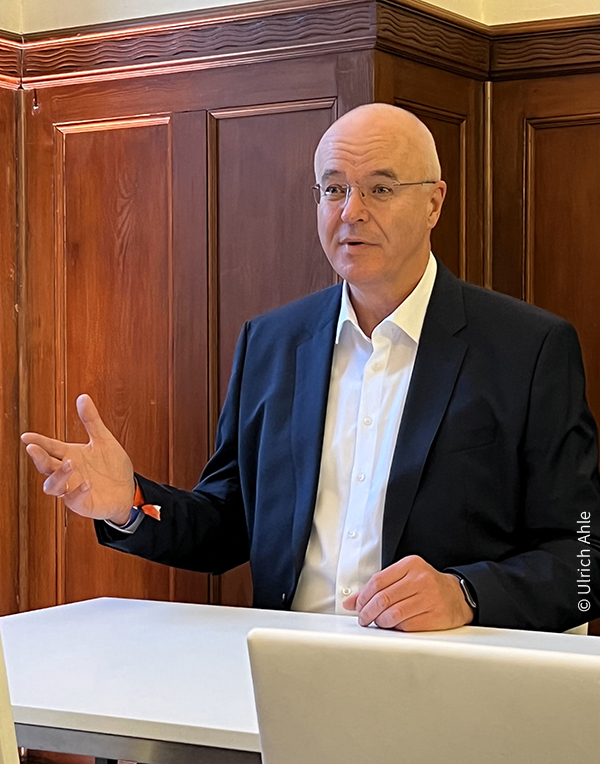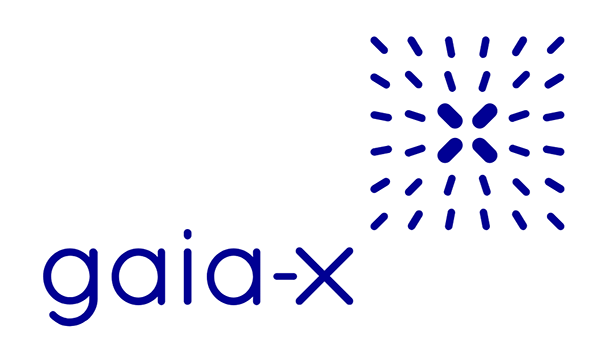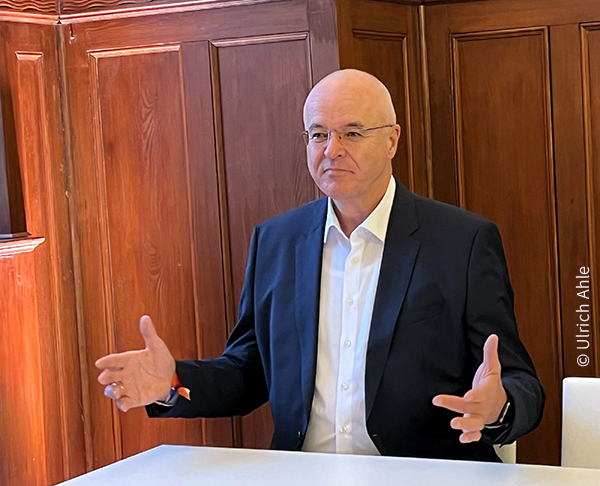
|
Gaia-X has the potential to change data management from the bottom upAn Interview with Ulrich Ahle Gaia-X, the European initiative to create interoperable data spaces, has a reputation for being slow and bureaucratic. Ulrich Ahle, previously CEO of the FIWARE Foundation, has now taken over the lead. His task is to coordinate the European stakeholders better and drive the use of data spaces in industry forward. He explains the objectives of Gaia-X and the potential it offers in an interview with the PROSTEP Newsletter. 
Question: Mr. Ahle, what is your most important task as new CEO of the Gaia-X Association and why do you find it so appealing? Ahle: I managed the FIWARE Foundation for seven years. FIWARE is now the world's leading open source technology, especially in the context of digitalization in the smart cities sector. The foundation has a clear strategy and is sailing calm waters, which cannot yet be said of the Gaia-X ecosystem. Steering it into calm waters is a challenge that I gladly accepted as there's nothing I love more than a challenge. My primary task will be to bring the different stakeholders involved in creating interoperable data spaces in Europe closer together. There is a large number of activities that are being financed by the European Union, the member states and also by private companies. In Germany, Catena-X, one of Gaia-X's showcase projects, and what is now being developed in the context of Manufacturing-X are particularly worthy of mention. One of my goals is to bring these activities closer together as the level of harmonization between them is sometimes inadequate. In addition, a solution approach needs to be defined and it must be accepted and used globally if it is to be sustainable. It is therefore necessary to not only work together with European cloud providers but also with global hyperscalers. Question: Surveys indicate that the majority of CEOs at Germany companies aren't familiar with Gaia-X. Can you give a brief explanation as to who or what Gaia-X is? Ahle: Gaia-X is an association that was originally founded by 11 German and 11 French companies with the aim of defining and implementing the framework conditions and guidelines that make it possible to create and operate interoperable data spaces. And do this on the basis of a federated cloud infrastructure and a European value system. Question: What advantages do these data spaces offer? What is the difference between them and previous forms of data communication? Ahle: In recent years, and in PLM environments in particular, we've created digital platforms that make it possible to link known data sources and development partners. We are connecting the few with the few. The aim of the data spaces is to connect the many with the many and to create mechanisms for linking and verifying previously unknown data suppliers and users without any need for manual intervention. The data spaces will replace the multitude of one-to-one connections between the partners in a supply chain by making it possible to connect to the data space just once and communicate with all the partners. This significantly reduces the complexity of data connections and interfaces. And we are able, for example, to map the CO2 footprint of a vehicle – one of the Catena-X use cases – much more easily because we have all the partners in a single data space. Question: The structure of Gaia-X is a bit confusing to outsiders. There's Catena-X but also the Mobility Data Space. How does that play together? Ahle: Creating a single European data space that covers all sectors and processes would be much too complicated. This is why the Data Spaces Business Alliance, which comprises FIWARE, Gaia-X, the International Data Spaces Association (IDSA) and the Big Data Value Association, defined the framework for designing interoperable data spaces two years ago. Although the approach involves different data spaces for different sectors, the data spaces will to a great extent use the same technical components, interfaces and data models to ensure interoperability. Data spaces for a variety of different sectors are therefore currently being created at European level. Catena-X, for example, is a data space intended specifically for the automotive industry... Question: The German automotive industry...? Ahle: Catena-X was initially a German initiative, but it is now gradually being globalized. Manufacturing-X is a data space for the rest of manufacturing industry that was set up as an international cooperation from the start. Then there is the Mobility Data Space, which was launched very early on in a pioneering project headed up by Acatech, and the aim is now to expand it at European level. There are over a dozen similar initiatives for creating data spaces for the energy industry, smart cities and smart communities, agriculture and other industries and sectors. What's important is that they remain interoperable, because it would be disastrous if a smart community were not able to communicate with a smart energy data space. Question: Last year, the German government canceled funding that had already been approved. Is Gaia-X running out of money? Ahle: It's not entirely correct to say that the funding was canceled. Requests for funding were made last year and projects were selected for this funding. The first wave of these projects has also received funding, for example, a cluster of four Mobility Data Space projects. Other projects were also supposed to receive funding but sufficient budgetary resources were no longer available. This has led to frustration and uncertainty. But when we now see that 150 million euros have been earmarked for Manufacturing-X alone, it's clear that that the German government is continuing to back Gaia-X. Question: Gaia-X has long been criticized for being too slow and too bureaucratic. Forrester even said that the project had no future. Is this criticism justified? Ahle: The supervisory board took the criticism on board and decided to do things differently. That is one of the reasons why I moved to Gaia-X. I want to do here what we did so successfully at FIWARE. I firmly believe that Gaia-X has the potential to become a game changer when it comes to data management. Otherwise I wouldn't have accepted this challenge. Question: The public has the false impression that Gaia-X is to become the new European hyperscaler. But that was never really the aim, was it? Ahle: No, it was never the association's aim to offer cloud services and operate data spaces itself. Instead, the aim is to define the framework conditions and architectures needed to enable interoperability and federated cloud structures and then implement them together with European cloud providers. Focus was placed on concepts like how to work with multiple cloud providers in a single environment and how to change providers relatively easily in order to avoid vendor lock-in. Question: Isn't the involvement of global hyperscalers like AWS or Microsoft, from which you actually want to become more independant, a contraction? Ahle: No, I don't think it's a contradiction. It's all about satisfying compliance requirements like the Data Governance Act, the Data Act and the General Data Protection Regulation or GDPR. These are the framework conditions for defining this type data space based on a European value system. We are, however, open to collaborating with hyperscalers if they accept these conditions. And we can already see that some of them are moving in this direction. AWS recently announced that they would be providing a European Sovereign Cloud. 
Question: You talk about a European value system. What does that mean in the context of data spaces? Ahle: It basically comes down to data sovereignty, i.e. that data producers are able to determine and technically enforce what someone who has access to their data can and may do with that data. However, it's also important to me that open source and shared data do not automatically mean that the data is free of charge. That is why our concepts also include mechanisms for data monetization, which incidentally is also very important for the sustainable operation of data spaces. Question: It's no doubt also important when it comes to persuading companies of the benefits that data sharing offers? Ahle: Data spaces provide two main benefits: The first is that they make data management much easier – not necessarily within the organization but whenever I need to share my data with other organizations. This saves me the cost of managing data. The second is that I create opportunities to earn money with data. A good example is using the sensors built into premium vehicles, which can park autonomously, to identify free parking spaces. The information is made available to the operators of smart parking solutions in the Mobility Data Space for a fee. Without the data space, a carmaker would have to enter into a commercial agreement with every city that wants to use the service and connect to their smart parking solution. Question: Does this application already exist or is it still a pilot project? Ahle: It's an actual application, but to be honest, we're only just getting started when it comes to the use of data spaces in industry. Question: You attended this year's Gaia-X Summit in November. Did you get the impression in Alicante that Gaia-X is finally gathering momentum? Ahle: Yes, it became clear in Alicante that Gaia-X is a reality. We had Oliver Ganser, CEO of Catena-X, on stage during our opening session and we presented Agdatahub, a data space for the digitalization of agriculture that is being created in France. Both solutions exist not only as a concept, they have also been implemented and are up and running. They are based on the Gaia-X Clearing House, which enables interoperability and makes available the functionality needed to identify and validate participants. There are now three providers of Gaia-X Digital Clearing Houses that have been accredited by the organization. T-Systems is one of them. Question: Some cloud providers have left Gaia-X and founded the European cloud alliance EUCLIDIA. Is it a serious competitor? Ahle: As I mentioned at the beginning, one of my objectives is to bring together the European players in particular. This also applies to EUCLIDIA. We need to join forces instead of working in an uncoordinated way or, in some cases, even competing with each other. This is an enormous task and I understand the impatience, especially the impatience felt by those who have invested money in Gaia-X. But it also takes time to organize things and bring the stakeholders together. Mr. Ahle, we wish you every success in this endeavor. 
About Ulrich Ahle Ulrich Ahle (born 1962) has been CEO of the Gaia-X Association (AISBL), which has set itself the aim of creating interoperable data spaces, since 1 November 2023. Prior to this, he was CEO of the FIWARE Foundation for seven years. Ahle launched his career at Nixdorf Computer AG after training as a toolmaker at the automotive supplier Hella and studying mechanical engineering at the University of Paderborn. He subsequently held a number of different management positions at Siemens Business Services and then worked for the IT service provider ATOS, where he was responsible for the consulting and systems integration business in Germany for customers in the manufacturing, retail and transportation industries for many years. Ahle was a member of the prostep ivip Association board for 16 years and is founder and member of the board of the International Data Spaces Association. |
|
| © PROSTEP AG | ALL RIGHTS RESERVED | IMPRINT | PRIVACY STATEMENT | YOU CAN UNSUBSCRIBE TO THE NEWSLETTER HERE. |
